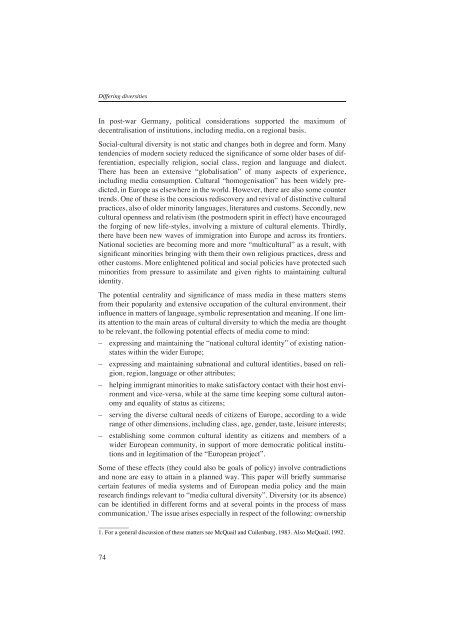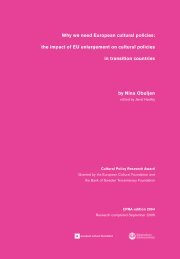<strong>Differing</strong> <strong>diversities</strong>In post-war Germany, political considerations supported the maximum <strong>of</strong>decentralisation <strong>of</strong> institutions, including media, on a regional basis.Social-cultural diversity is not static and changes both in degree and form. Manytendencies <strong>of</strong> modern society reduced the significance <strong>of</strong> some older bases <strong>of</strong> differentiation,especially religion, social class, region and language and dialect.There has been an extensive “globalisation” <strong>of</strong> many aspects <strong>of</strong> experience,including media consumption. Cultural “homogenisation” has been widely predicted,in <strong>Europe</strong> as elsewhere in the world. However, there are also some countertrends. One <strong>of</strong> these is the conscious rediscovery and revival <strong>of</strong> distinctive culturalpractices, also <strong>of</strong> older minority languages, literatures and customs. Secondly, newcultural openness and relativism (the postmodern spirit in effect) have encouragedthe forging <strong>of</strong> new life-styles, involving a mixture <strong>of</strong> cultural elements. Thirdly,there have been new waves <strong>of</strong> immigration into <strong>Europe</strong> and across its frontiers.National societies are becoming more and more “multicultural” as a result, withsignificant minorities bringing with them their own religious practices, dress andother customs. More enlightened political and social policies have protected suchminorities from pressure to assimilate and given rights to maintaining culturalidentity.The potential centrality and significance <strong>of</strong> mass media in these matters stemsfrom their popularity and extensive occupation <strong>of</strong> the cultural environment, theirinfluence in matters <strong>of</strong> language, symbolic representation and meaning. If one limitsattention to the main areas <strong>of</strong> cultural diversity to which the media are thoughtto be relevant, the following potential effects <strong>of</strong> media come to mind:– expressing and maintaining the “national cultural identity” <strong>of</strong> existing nationstateswithin the wider <strong>Europe</strong>;– expressing and maintaining subnational and cultural identities, based on religion,region, language or other attributes;– helping immigrant minorities to make satisfactory contact with their host environmentand vice-versa, while at the same time keeping some cultural autonomyand equality <strong>of</strong> status as citizens;– serving the diverse cultural needs <strong>of</strong> citizens <strong>of</strong> <strong>Europe</strong>, according to a widerange <strong>of</strong> other dimensions, including class, age, gender, taste, leisure interests;– establishing some common cultural identity as citizens and members <strong>of</strong> awider <strong>Europe</strong>an community, in support <strong>of</strong> more democratic political institutionsand in legitimation <strong>of</strong> the “<strong>Europe</strong>an project”.Some <strong>of</strong> these effects (they could also be goals <strong>of</strong> policy) involve contradictionsand none are easy to attain in a planned way. This paper will briefly summarisecertain features <strong>of</strong> media systems and <strong>of</strong> <strong>Europe</strong>an media policy and the mainresearch findings relevant to “media cultural diversity”. Diversity (or its absence)can be identified in different forms and at several points in the process <strong>of</strong> masscommunication. 1 The issue arises especially in respect <strong>of</strong> the following: ownership__________1. For a general discussion <strong>of</strong> these matters see McQuail and Cuilenburg, 1983. Also McQuail, 1992.74
Reasearch position paper 1and control <strong>of</strong> media; the structure <strong>of</strong> distribution systems; the content that is<strong>of</strong>fered; the composition <strong>of</strong> audiences and the patterns <strong>of</strong> use.Media structure and cultural diversityMost <strong>of</strong> the mass media in <strong>Europe</strong> are run as private businesses and any benefit (orharm) to the cause <strong>of</strong> cultural diversity as indicated by the above-mentioned goalshas to be mediated through the market, with conditions varying from country tocountry. In general it is thought that large scale and concentrated media workagainst cultural diversity. However, <strong>Europe</strong> is very variable in the degree <strong>of</strong> concentrationand centralisation <strong>of</strong> its media and in many countries there are strongregional and local media press systems. 1 Cable and other forms <strong>of</strong> distributionhave helped to increase the range <strong>of</strong> television channels and to develop local andcommunity media provision. 2 The general view from the media industry is thatminority media cultural needs can generally be met by the free media market, providedsufficient demand is present. However, the media market favours largermarket segments as well as richer and younger customers, and may not serve theneeds <strong>of</strong> many social and cultural minorities that do not meet these criteria. We canthus expect to find inconsistent trends as a result <strong>of</strong> market forces – sometimestowards diversity, sometimes towards homogeneity and convergence.Media policy for cultural diversity in <strong>Europe</strong>Governments are not generally able to intervene effectively in media in order t<strong>of</strong>oster the goal <strong>of</strong> cultural diversity, although attempts have been made by way <strong>of</strong>press subsidies and other forms <strong>of</strong> support. 3 Even in relation to broadcasting, governmenthas to keep its distance from decisions about content and public broadcastinghas to make its way in a competitive audience market. Most policy decisionsabout the media and cultural diversity are taken at national level andcountries have generally been jealous <strong>of</strong> their sovereignty in this respect. As aresult, the scope for <strong>Europe</strong>an level action is very limited and policy initiatives aremainly confined to aims that cannot be achieved at national level (the subsidiarityprinciple at work).National media policy has promoted cultural diversity in varied ways, accordingto criteria that happen to be salient in the given case (for instance, language,region, ethnicity, religion, gender, etc.). There is also variation according to themedium concerned. In the case <strong>of</strong> newspapers, there is little policy or regulation,but some national subsidy systems target selective subsidies at specific publications.Murschetz (1998) cites the example <strong>of</strong> Norway, where subsidies are availablefor immigrant community publications and those <strong>of</strong> the Sami indigenousminority. Broadcasting regulation <strong>of</strong>fers numerous examples <strong>of</strong> requirements to__________1. See, for example, Gustafsson and Weibull, 1997; De Bens and Østbye, 1998.2. See Jankowski, Prehn and Stappers, 1992.3. See, for instance, Picard, 1985; Skogerbo, 1997.75
- Page 5 and 6:
PrefaceThe present text constitutes
- Page 7:
Part IDiffering diversities:transve
- Page 11 and 12:
The study: background, contextand m
- Page 13 and 14:
Transversal study on the theme of c
- Page 15:
Transversal study on the theme of c
- Page 18:
Differing diversitiesi. new forms o
- Page 23 and 24: IntroductionTransversal perspective
- Page 25 and 26: Transversal study on the theme of c
- Page 27 and 28: The challenge of diversityCulture,
- Page 29 and 30: Transversal study on the theme of c
- Page 31 and 32: Transversal study on the theme of c
- Page 33 and 34: Diversity, citizenship, and cultura
- Page 35 and 36: Transversal study on the theme of c
- Page 37: Transversal study on the theme of c
- Page 40 and 41: Differing diversitieslanguages. The
- Page 42 and 43: Differing diversitiesprogrammes int
- Page 45 and 46: Culture, government and diversity:p
- Page 47 and 48: Transversal study on the theme of c
- Page 49 and 50: Transversal study on the theme of c
- Page 51 and 52: Transversal study on the theme of c
- Page 53: Transversal study on the theme of c
- Page 56 and 57: Differing diversitiesin the pursuit
- Page 58 and 59: Differing diversitiesthe need for m
- Page 60 and 61: Differing diversitiescircumstances
- Page 62 and 63: Differing diversitiesclasses artist
- Page 64 and 65: Differing diversitiesMy point, then
- Page 66 and 67: Differing diversitiesiii. that the
- Page 69: Transversal study on the theme of c
- Page 73: The consequences of European media
- Page 77 and 78: Reasearch position paper 1directly
- Page 79 and 80: Reasearch position paper 1There hav
- Page 81 and 82: Reasearch position paper 1presence
- Page 83 and 84: Reasearch position paper 1Strategic
- Page 85 and 86: Reasearch position paper 1New media
- Page 87 and 88: Reasearch position paper 1Blumler,
- Page 89 and 90: Reasearch position paper 1Hoffmann-
- Page 91 and 92: Reasearch position paper 1Pauwels,
- Page 93 and 94: Assessing the implementationof cult
- Page 95 and 96: Reasearch position paper 2tics abou
- Page 97 and 98: Reasearch position paper 2Act (GPRA
- Page 99 and 100: Reasearch position paper 2factually
- Page 101 and 102: Reasearch position paper 2The evalu
- Page 103 and 104: Reasearch position paper 2capacity
- Page 105 and 106: Reasearch position paper 2Luchtenbe
- Page 107 and 108: The cultural policies of the Europe
- Page 109 and 110: Reasearch position paper 3went, wou
- Page 111 and 112: Reasearch position paper 3The histo
- Page 113 and 114: Reasearch position paper 3integrati
- Page 115 and 116: Reasearch position paper 3of differ
- Page 117 and 118: Reasearch position paper 3European
- Page 119 and 120: Reasearch position paper 3voice to
- Page 121: Reasearch position paper 3Howe, Mar
- Page 124 and 125:
Differing diversitiesContemporary d
- Page 126 and 127:
Differing diversitiesWhereas in the
- Page 128 and 129:
Differing diversitiesbuilding on th
- Page 130 and 131:
Differing diversitieswhen tackling
- Page 132 and 133:
Differing diversitiesand that is pr
- Page 134 and 135:
Differing diversitiesSennett, Richa
- Page 136 and 137:
Differing diversitiesallowing their
- Page 138 and 139:
Differing diversitiesNevertheless,
- Page 140 and 141:
Differing diversitiesgrowth also ex
- Page 142 and 143:
Differing diversitiesAt a deeper le
- Page 144 and 145:
Differing diversitiesconventional c
- Page 146 and 147:
Differing diversitiesworks, and the
- Page 148 and 149:
Differing diversitiesNational sover
- Page 150 and 151:
Differing diversitiesSimilarly, at
- Page 152 and 153:
Differing diversitiesCoombe, Rosema
- Page 154 and 155:
Differing diversitiesWoodmansee, Ma
- Page 156 and 157:
Differing diversitiesIndeed, which
- Page 158 and 159:
Differing diversitiesThe second maj
- Page 160 and 161:
Differing diversitiesexample by Hol
- Page 162 and 163:
Differing diversitiesincreased broa
- Page 164 and 165:
Differing diversities“Black Carib
- Page 166 and 167:
Differing diversitiesBunt, Gary, 19
- Page 169 and 170:
Preserving cultural diversity throu
- Page 171 and 172:
Reasearch position paper 7unique, t
- Page 173 and 174:
Reasearch position paper 7legislati
- Page 175 and 176:
Reasearch position paper 7appropria
- Page 177 and 178:
Reasearch position paper 7Indeed, m
- Page 179 and 180:
Reasearch position paper 7- means t
- Page 181 and 182:
Reasearch position paper 7cyberspac
- Page 183 and 184:
Reasearch position paper 7extended
- Page 185 and 186:
Reasearch position paper 7It is rec
- Page 187 and 188:
Reasearch position paper 7lose loca
- Page 189 and 190:
Reasearch position paper 7six proje
- Page 191 and 192:
Reasearch position paper 7and innov
- Page 193 and 194:
Reasearch position paper 7Programme
- Page 195 and 196:
Reasearch position paper 7Reference
- Page 197 and 198:
Reasearch position paper 7Papers on
- Page 199:
Reasearch position paper 7Swaminath
- Page 202:
Sales agents for publications of th














